- Home
- Barry Unsworth
Losing Nelson Page 9
Losing Nelson Read online
Page 9
Alongside came my honoured friends: the scene was terribly affecting; up flew her ladyship, and exclaiming, “Oh God, is it possible?” she fell into my arm more dead than—
“Did you say arm?” Miss Lily said. “Oh yes, I see, he only had one by this time, didn’t he?” She giggled a bit. “Sorry.”
I made no reply to this but observed a pause before continuing in order to mark my disapproval of the interruption. I hope some day to have the pleasure of introducing you to Lady Hamilton, she is one of the very best women in this world. How few could have made the turn she has. She is an honour to her sex …
I paused again here, as I wished to insert some speculations that I had written the evening before about Fanny’s reactions to these words. It was typical of Horatio’s frank and enthusiastic nature that he should write in such terms to a wife so conventional, so far away and lonely, who must have known Emma’s fame as a beauty, must have known too about her earlier career as mistress to the rich.
“One wonders,” I began, “what Lady Nelson would privately have made of—”
But Miss Lily was not typing. She was sitting inactive at the keyboard. After a moment she turned to me with an expression of perplexity I knew at once to be false. She said, “What does that mean, an honour to her sex?”
Now this was not, strictly speaking, a legitimate question for Miss Lily to ask; it did not arise from any difficulty in carrying out her task of typing. That she should ask it at all—and even more that I should attempt to answer it—was a mark of the changed relations between us and her talent for taking over the ground.
“He was paying her a compliment,” I said. “He thought she did credit to her sex.”
“No, but what does it mean?” Her face wore the same expression as when she had talked about Scott of the Antarctic.
I tried again. “He thought her a fine example of womanhood.”
“Nelson was a fine example of manhood, I suppose.”
The grotesqueness of this understatement almost made me laugh aloud. “Only the finest this nation has ever produced or ever will.”
“Could someone writing about him say he was an honour to his sex?”
I thought for a moment, Miss Lily’s eyes intently on me. “Well, not in so many words.”
“It is words we are talking about, isn’t it? Could it mean he was brave or had a good character or that there was something special about him, like he was very strong or …” Miss Lily’s indignation wavered a bit. “Something physical,” she said. “Could it be that?”
“No, I don’t think so.” I was growing weary of this conversation, for which, after all, I was paying at the rate of fifteen pounds an hour.
“It isn’t what you would call logical, that’s all I am saying,” Miss Lily said.
“It meant something to Horatio, and that is the point at issue, in my opinion. You have to think historically.” But this was something, I had already discovered, that Miss Lily never did. She used the past tense, but she had no sense of the past at all. Everything and everybody lived in a perpetual present in her mind.
She looked at me now in silence for a moment or two, compressing her lips as if considering how to reply. The expression gave an unaccustomed severity to her face, slightly increasing the prominence of her cheekbones, thinning out the rather full lower lip. “Well,” she said, “instead of talking about honour to her sex and so forth, he should have had the sense to see that she was just making a big scene of it. How long had she known he was on the way—three or four weeks, wasn’t it? She had plenty of time to get the act together.”
“Perhaps we could move on?” I said. I spoke rather coldly. It was true, of course, that Horatio was simple-hearted and devoid of guile, but I didn’t like Miss Lily’s tone; it reflected on his intelligence. She was not much taken with Emma, that was obvious—but I didn’t want to lose more time discussing the matter, I was keen to make the two-year hop, to reach the haven of June 1800, the departure from Naples.
All the same, we had not proceeded far when there was another interruption. I was dictating a passage very much altered and revised, describing the return to England of Horatio and the Hamiltons. A strange trio they must have seemed to those who met them at this time: the admiral so wizened, so decked with stars and medals, returning to popular applause and establishment disfavour; Sir William not far from his end, his face like parchment, his liver in ruins after thirty-six years at the Naples court; Emma large and flaunting and noisy, heavier now but beautiful still, facing an uncertain future in England, on affectionate terms with both husband and lover, as were these with each other. Tria juncta in uno, they called themselves: three joined in one. The motto of the Order of the Bath, to which both men belonged. Emma’s phrase, perhaps. Horatio could never have said it; he was joined with no-one, ever, he was unique. He travelled with them, yes; so much is true. As a trio they did not make a good impression, at least not on their compatriots. I was obliged to admit this, though it pained me that he could be so misjudged. It was not any fault of his. He was on land, he was in travesty. And he was envied. In my book I was intending to quote a passage from General Sir John Moore’s diary as typical of this prejudice against him. In the summer of 1800, in Leghorn, Moore made a brief note: Sir William and Lady Hamilton were there attending the Queen of Naples. Lord Nelson was there attending on Lady Hamilton. He is covered with stars, ribbons and medals, more like a Prince of the Opera than the Conqueror of the Nile. It is really melancholy to see a brave and good man, who has deserved well of his country, cutting so pitiful a figure.
Moore did not remark on the strangest fact of all: Rear-Admiral Lord Nelson of the Nile and of Burnham Thorpe was returning home overland. It was a decision that had always perplexed me. An admiral recalled after famous victories, his flagship waiting in the bay … I was arriving at this point now in my dictation.
“In Nelson’s life, as in all lives, there were concurrent paths, lines running in parallel, each characterized by a cluster of attributes particular to itself, appearing simple in stated form but complex and subtle in suggestion. The obvious broad division in Nelson’s case was between sea life and land life. At sea he was himself, he was performing the task for which he was gloriously fitted; on land he sometimes faltered, his faculties lost the concentration of genius they possessed at sea. Why then, in that June of 1800, did he choose to return home by land? Was it for the pregnant Emma’s sake, because she was unwilling to face the long voyage? Had Sir William some business to see to on the way? Or was it that Nelson himself was anxious to postpone—”
But Miss Lily had paused again. Without looking at me—she was regarding the screen of her computer—she said, “I have a good idea why they went by land.”
I became aware of needing patience, a considerable store of it. “Have you?”
“It was the obvious choice, really. I mean, they were a travelling show by this time, weren’t they?”
“What on earth do you mean?”
“Everybody knew about them in advance, wherever they went. So the more places they went to, the better, that’s all I am saying. From the point of view of the spectacle, that is. It was like a tour. I mean, they took risks going by land, didn’t they? Napoleon had just defeated the Austrians at the Battle of Marengo. He was invading Italy again. Their carriage passed within a mile of the French outposts. It would have been much safer by sea, but that way they wouldn’t have been able to put on the show, would they? Trieste, across Slovenia, then through the Alps to Klagenfurt and Vienna, then Prague and Dresden, then all those little courts in Germany, all the way to Hamburg. Everywhere they went, fireworks, bands playing, spectators by the thousand. I mean, it’s obvious, isn’t it? It was a show, they were stars—that’s all I am saying.”
For some moments, hearing her say these things about Horatio, hearing her compare this greatest of men to a travelling player, I felt a mixture of fury and distress that I was afraid might have drained the blood from my face. I turned away f
rom her in a pretence of looking at the shelves of books, as if in search of some reference. I could not read the titles; agitation blurred my sight. But I felt no urge to move round behind her, no impulse to renew that terrible scrutiny. All I wanted was to hide my feelings. She was immune, and somehow she knew it. I cannot describe my sense of this more exactly. It was as if she had got inside my guard.
However, something else came now into mind, the disturbance in my feelings settled into a kind of curiosity. Still with my face turned away, I said, “How is it that you know so much about the circumstances of the journey, the route they took and so forth? We haven’t done this part before.”
“I got a book out of the library.”
At this I turned to face her. She was sitting quite composed, her hands resting quietly on either side of the keyboard. “What book?” I asked her.
“It’s about the three of them, Nelson and the Hamiltons. It’s by a man called Russell.”
“I know the book. I’ve got it here.” I made a gesture towards the shelves. I was touched, deeply, inordinately, that Miss Lily had shown this interest, had taken the trouble to borrow this book from the library. My rage was forgotten. “Quite good,” I said. “A bit on the chatty side.”
“That’s what I like about it.” She smiled suddenly, her first real smile of the whole evening. It occurred to me now that her sharpness of tone, her tendency to interrupt, those disrespectful remarks about Horatio, might have been due simply to wounded feelings at my seeming to doubt her word in the matter of his wedding date. (I was wrong about this, as it turned out. She continued to argue and interrupt on a regular basis.)
I don’t know how it happened—an accidental combination of circumstances, the smile, this moment of perception coming after my rage, a desire to trump the shortbread biscuits: before I knew it, I was asking Miss Lily if she would like to go to Portsmouth one of these days to visit HMS Victory, Horatio’s flagship, now permanently docked there.
“Well, that would be nice.” Miss Lily’s eyes were bright and helplessly steady and somehow relentless. “Get a bit of sea air,” she said. “It would have to be a Saturday.”
9
Almost as soon as Miss Lily had gone I fell prey to doubts about the wisdom of this Portsmouth offer. The typing sessions were one thing—they were limited in duration, specific in function, easily controllable, though Miss Lily was showing alarming signs now of breaking through the fences. The trip to Portsmouth was a very different matter. It involved a whole day; we would be thrown together, obliged to converse, to look at each other, in a train, in a café, without the protection of the desk, the bookshelves, my dictating voice. The prospect made me feel nervous.
On the other hand, there was a certain excitement in the idea and an element of self-congratulation—I had acted spontaneously, I had taken a leap. As I thought more about it, this aspect came upper-most. All in all, I decided, it had been a Nelsonian gesture, putting me, albeit briefly, on a plane with him. Of course, he was an angel, he was a creature of free, untrammelled action; in him, impulse and decision were fused together, sheathed in the same fire. But for him too there were periods of monotony, of a constricting sameness—the weeks and months of blockading duties, the long pursuit of an elusive enemy over immensities of ocean.
And there were the periods on land, that time of travesty in Naples and Palermo, the long years of enforced inactivity on half-pay in Norfolk. I thought about these Norfolk years now as I sat on in my study, which was still somehow not quite empty of Miss Lily. How you must have hated it. Twenty-eight years old, just married, distinguished service in home waters, the West Indies, North America. Clear already that you were a commander of no ordinary gifts. Zealous, energetic, fearless in combat, a superb seaman. You had influential patrons—essential for any rapid advancement in the navy at that time. And yet you found yourself placed on half-pay and living with your wife in your father’s parsonage in the village of Burnham Thorpe in Norfolk, where you were born, which you left at twelve to go to sea. And you remained there, beached up, for more than five years.
Who the ill-wishers were, the nature of the enmity—presumably it was among the lords of the Admiralty—are questions difficult now to determine. In fact, no-one will ever answer them fully, though I had tried to address them in my book. Of course, it was a period of relative peace and low naval employment. The War of American Independence was over; the French Revolutionary War had not yet begun. A brief lull in the almost incessant fighting of the century. All the same, lesser men got ships. He himself never understood the matter. While stationed in the Leeward Islands he had made enemies; he had insisted on enforcing the Navigation Act, by the terms of which American ships could not trade in the British colonies. He had ordered the seizure of ships attempting to break the embargo, and this had caused financial loss to a number of influential people and led to quarrels with the governor, Sir Thomas Shirley. Perhaps his friendship with Prince William did him harm; the prince had enemies in high places and was not always on good terms with his father, George III. However this may be, when Horatio, that devoted servant of kings, applied for help to Lord Hood, whose patronage had been promised, he was told that no request could be made to the Admiralty on his behalf for a ship, as the King was impressed with an unfavourable opinion of him.
This was in 1790, halfway through your exile. It must have been a heavy blow, this royal disapproval. Worse was to befall you ten years later on your return to London after what Miss Lily so perversely referred to as the travelling show, when you were deep in disfavour. At a royal levee, King George snubbed you publicly, addressing a brief remark to you, then turning his back when you started to reply. On that occasion, ironically, you had arrived decked out with the gifts of kings: the gold medal for Cape St. Vincent, the Star of the Bath, the Sicilian order conferred by King Ferdinand, and a resplendent aigrette, or plume of triumph, from the grand signior of Turkey, which had thirteen strands of diamonds, one for each of the French warships taken or destroyed at the Nile, and in the middle a radiant star turning on its centre by means of concealed clockwork. This glittering plumage, with its spinning centre, you wore in your hat …
Unkindness from kings cut you deeply. You needed a higher power, divinely appointed, to seal and sanctify your courage and achievement, to bestow the decorations that you hung about your person, signs of favour, marks of status. Perhaps that is why you detested rebels and revolutionaries so much—they had violated the principle of authority and authentication that gave your whole existence its meaning. And I was with you there, as in all else, every inch of the way. Without recognized authority, there is no concept of the sacred, a Nelson cannot be born.
You hated the French even before they rose in revolt, even before they killed their king. You got that from your mother. Catherine Nelson talked fiercely against the French. For the whole of your infancy, the two nations were locked in bitter combat from Quebec to Bengal. Was it this fierce mother that made you believe so in legality, in vested powers? I believe in these things too, but my mother wasn’t fierce; she admired Gandhi, she practised yoga, a word that disturbed my childhood with painful questions, not fearful. Nothing about her inspired fear in me; she was always gentle, she touched things as if to avoid hurting them, even things that couldn’t feel. But I could not discover what this yoga was and never saw her do it; the door was always locked. I knew the rug she used, she left it there on the floor, it was thin and made of cotton and had a twining pattern of dark pink and pale blue tendrils. When she left us, she took it with her. Now I have a clearer mental picture of this rug than I have of her face. There were no photographs, they disappeared overnight, my father destroyed them all. I thought for years he had put them away somewhere, but when I went through things after his death, there were none to be found.
A total belief in constituted authority—that’s how you made enemies. You were applying the law, you were doing your duty; how could you be at fault? I would have done the same, absolutely.<
br />
It was very quiet in my study as I sat there, thinking these thoughts, communing with him. In that short terrace where my house is, just off England’s Lane, the sound of traffic is barely audible, more like a graining of the silence than a sound, something you easily get used to. I felt very close to him that night, I had the feeling of confirmation, like a current of power.
He was innocent and open-hearted. Miss Lily did not understand this when she criticized his letter. Only an innocent man could have written to an insecure wife in the terms he did, extolling the virtues and attractions of a famous beauty and former courtesan who was there on the spot, swooning in his embrace. The swoon was real enough—I forgot to tell Miss Lily that; Emma was quite bruised by the fall.
No, you were innocently set on describing the nature of your triumph, of your glory … or didn’t you care?
This thought, intensely disagreeable, swooped on me before I could block it. Of course he would have cared; that was not the point. But did he see? Enthusiasm, generosity of judgement—these are merely terms, they can mean more than one thing. Was it that Horatio didn’t see other people as existing in a space separate from his own, that he couldn’t admit into his mind the possibility of different minds? Not opinions, he was used to differing over the conduct of battles, but sensibilities, other ways of feeling things.
The silence in my room had lost its comfort, it had become stark, there was no refuge in it. So often lately, since my father’s death, I had been undermined by unworthy thoughts of this kind, proof not of any defect in Horatio but of my own corrupted nature. It was a poison that spread, and the centre of the discharge was Naples. I was struggling against darkness now, this madness of judgement that opened the gulf between us, broke the current of power. I felt that constriction in my breathing and the throbbing somewhere behind the eyes that always accompany my agitation. Then the room was again bright and clear about me. I could feel the beat of my heart, but my breathing came easier. I had realized my error. I had been upsetting myself over irrelevant issues. You had every virtue that could be reconciled with the mission and destiny of a hero. Probably, too, I had been unconsciously confusing your physically impaired sight with moral blindness, a great blunder—there was no doubt, of course, that your eyesight was deteriorating; even before the wound, while you were still “on the beach” in Norfolk, from the inner corner of each eye, a membranous substance was beginning to cover the ball. If you had lived to be old, you would have died blind.

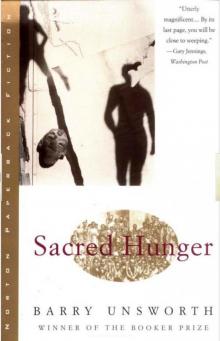 Sacred Hunger
Sacred Hunger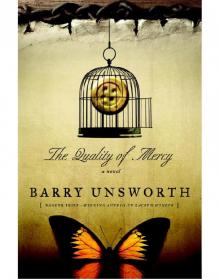 The Quality of Mercy: A Novel
The Quality of Mercy: A Novel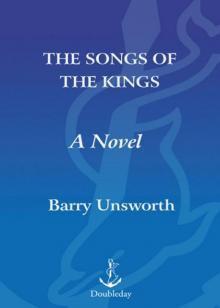 The Songs of the Kings: A Novel
The Songs of the Kings: A Novel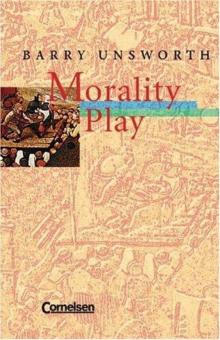 Morality Play. Mit Materialien. (Lernmaterialien)
Morality Play. Mit Materialien. (Lernmaterialien)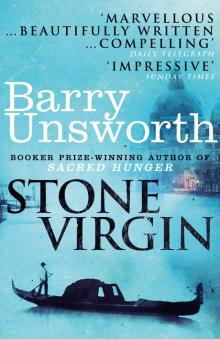 Stone Virgin
Stone Virgin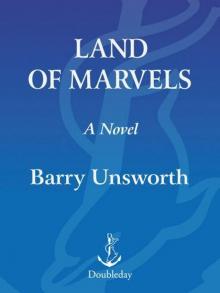 Land of Marvels
Land of Marvels Mooncranker's Gift
Mooncranker's Gift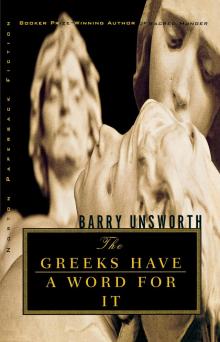 The Greeks Have a Word for It
The Greeks Have a Word for It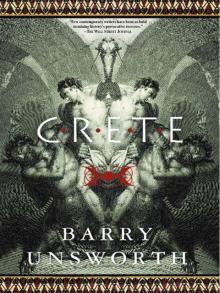 Crete
Crete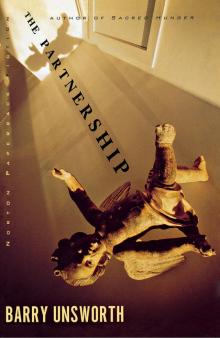 The Partnership
The Partnership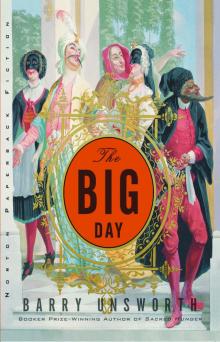 The Big Day
The Big Day The Hide
The Hide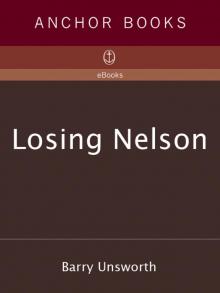 Losing Nelson
Losing Nelson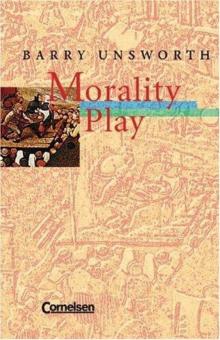 Morality Play
Morality Play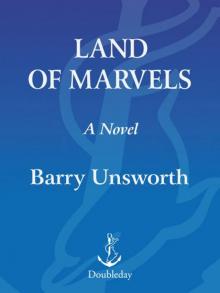 Land of Marvels: A Novel
Land of Marvels: A Novel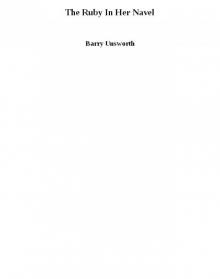 The Ruby In Her Navel
The Ruby In Her Navel